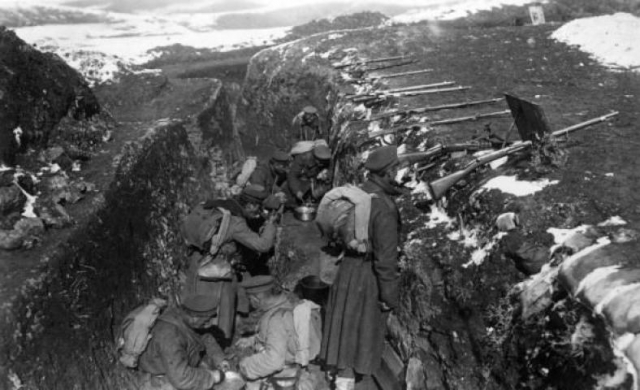Anastasia Balezdrova
In the period 22-24 October Thessaloniki will host an international conference on "The Salonica Front in World War I", organized by the Aristotle University, the University of Macedonia and the Institute for Balkan Studies in Thessaloniki.
The occasion is the centennial anniversary of the establishment of the front and its importance for the outcome of the war. Dozens of contemporary historians from many countries, including Greece, Bulgaria, Serbia, Great Britain, France, Russia and many more will present reports during the conference.
 GRReporter talked with chairman of the organizing committee of the conference Yiannis Mourelos. He is a Modern History Professor at the History Department of the Aristotle University of Thessaloniki and Vice-President of the Institute for Balkan Studies. At the conference he will present his report on "The Salonica Front in World War I. Political Challenges and Strategic Planning."
GRReporter talked with chairman of the organizing committee of the conference Yiannis Mourelos. He is a Modern History Professor at the History Department of the Aristotle University of Thessaloniki and Vice-President of the Institute for Balkan Studies. At the conference he will present his report on "The Salonica Front in World War I. Political Challenges and Strategic Planning."
Mr. Morelos, why is turning back to this period of history in the Balkans important? What is the purpose of conducting the conference?
The aim is to celebrate the centennial anniversary (5 October) of the arrival of the first Allied troops in Thessaloniki, i.e. the creation of the Salonica Front. Therefore the events in the rest of the Balkans in terms of the specific situation were part of an even broader context, namely World War I.
Of course, the Balkans were part of this war long before the opening of Salonica Front. The war began in the summer of 1914, after the assassination of the heir to the Austro-Hungarian throne by a Serbian nationalist. A war between Austria-Hungary and Serbia followed, which quickly became a European war. This expansion of the war, the fact that it took place only on the main front, from the appearance of the trenches until the end of 1914, drove different staffs to encourage peripheral hostilities. Two such fronts started to operate in our region. One was the front at Gallipoli and after the excruciating experience of the Allies, they formed there the Salonica Front in order to help Serbia that was in a state of collapse.

Even today in Bulgaria there is a sentiment that parts of northern Greece were always Bulgarian territories and the Bulgarian army actually did not enter into a foreign territory but went to defend its own land. Why does Greece consider these areas its own?
This was the argument used by the Bulgarian side. The question is whether this is the historical truth from the moment that Bulgaria declared its independence as a state in 1908. Of course, it was autonomous before that, after the Berlin Congress, and even earlier there was also a Greater Bulgaria that existed no longer than a few months after the Treaty of San Stefano.
It is expected in such a situation of war, during such a generalized war at that, that historical dimensions be attached to arguments that are actually deprived of such dimensions. This is because the historicity of Thrace and Eastern Macedonia dates back to ancient times in terms of the Greek cultural and demographic presence.
In these regions there was a Bulgarian population. The Bulgarian public space talks about the assimilation of this population. Is that correct?
I do not think so. The argument that I will use to support my opinion refers to the post war reality. I mean the convention for voluntary migration of populations that accompanied the Neuilly Peace Treaty signed by the winners in the war and Bulgaria. Under it, everyone on both sides of the border, including the populations of Greek origin who lived on the territory of Bulgaria at the time, were free to move to another country. And they benefited from this right.
And I would say that, to a certain extent, the Convention of Neuilly was more moral and correct compared with the agreement for the obligatory exchange of populations between Greece and Turkey that was signed a few years later.
Did people have a distinct sense of national identity at that time? Could we say that all who considered themselves Bulgarians left Greece?
Having decided to take advantage of this right, obviously the answer is yes. And again I would like to emphasize that I am talking about the people on both sides of the border. The fact that they decided to migrate from one country to another on their own initiative and by their own wish apparently means that they had national consciousness. Therefore, they decided to go to the country, which they considered to be closest to their upbringing, religion, culture, beliefs and traditions.

Bulgarian soldiers in the trenches of the Salonica Front
What were the factors that determined the end of the war?
This is a very important issue because the Salonica Front was understated during the war and also by the subsequent historiography until the present day. My opinion is that the reason for this is the following: we are talking about a European war that for nearly four years was a war of positions, not of actions and manoeuvres. The operations were static, with a very high mortality rate.
In September 1918, the troops of the Entente attacked Thessaloniki, the front broke up, mainly in the region of Dobro Pole, they entered Serbian territory on one side and Bulgarian and Ottoman territory on the other and suddenly the war acquired a new mobility that it had lost for quite a long period. Events developed very quickly.
The attack began on 14 September 1918 and on 29 September, i.e. two weeks later, Bulgaria capitulated. The Ottoman Empire surrendered on 30 September, the Austro-Hungarian Empire in early November and Germany followed it. That is, we see a "domino effect" taking place in a very short period of time. Within two months after over four years of static war, it became active and put an end to the war itself.
Let me recall that, despite the US intervention in the war in 1917, the fact that the armistice with Russia was signed separately with the Treaty of Brest-Litovsk released significant German forces that were transferred to the Western Front. And in most of 1918, it was quite impossible to forecast the development of the war on the Western Front. Ultimately, the decision on the Entente came from the Salonica Front. In this way it unexpectedly "stole the glory" and put an end to this war, naturally with far fewer casualties. Overall, the human lives lost in the Balkans were much less than those on the Western and Eastern Fronts. On the Western Front, 60,000 people only from the ranks of the British troops were killed in the first day of the Battle of the Somme in 1916 July alone.
We did not have such losses and that probably explains the presence of a certain embarrassment with regard to Thessaloniki’s contribution to the outcome of the war. Perhaps because the victims here were not so many, it somehow was considered "not right-minded" to assume that the decision to end the war had come precisely from where nobody expected.
In your opinion, why was Greece always able to make the right choice and be on the side of the right cause that won both wars and Bulgaria was not?
In methodological and scientific terms I do not agree at all with this and I will explain what I mean. Each choice is made on the basis of the conditions at the specific time. If only the person who has to choose between two or three alternative solutions were able to know how his choice would develop.
This question is not of scientific merit. All choices without exception were made on the basis of specific facts that were considered at that particular moment. The fact that the forces of the Allies won the war was simply a development that came long after the specific choice had been made.
I reject the notion that Greece has always made the right choice as I reject the notion that Bulgaria has always made the wrong one. Every historian seeks to evaluate the conditions existing at the time of making this choice, which ultimately determine it.

Bulgarian soldiers overlooking Kavala port from the fortress above the town
How did the outcome of World War I determine the events of World War II, when the Bulgarian war entered northern Greece again?
Generally, the course and the end of World War I affected the events both throughout the interwar period and during the first phase of World War II. According to one theory, the period from the beginning of World War I to the end of World War II is a "second thirty-year war", that is, it examines the entire period as a single one.
Surely, the terms of the peace treaties at the end of World War I, which in some cases were too stringent, caused manifestations of revisionism in the Balkans, on the part of Bulgaria and in Central Europe, on the part of Germany.
Of course there is continuity and it is very interesting considering it in all its phases, because historical phenomena evolve over time. It cannot freeze. Every phenomenon has its origins, development and consequences. Therefore we have to give historical phenomena the "oxygen" that they need so that we can examine them and their development over time.
From this perspective, we could assume that there was continuity between World War I and World War II. This applies to the European area as a whole, the Balkans and especially to Greek-Bulgarian relations.
Allegedly they are in their best phase at present.
I remember a period of change in Greek foreign policy towards the Balkan countries, which happened as early as the 1970s, after the fall of the dictatorship in Greece. Bulgaria had a distinctive place in this change. And because I knew the Ambassador of Bulgaria to Athens at the time, Nikolay Todorov, I remember that, even then and despite the fact that the so-called Cold War was still in effect, the atmosphere in the relations between the two countries had already begun to warm up.